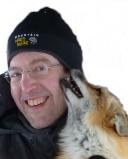In our textbook on evolutionary biology, my coauthor Carl Bergstrom and I write:
“...let us pause for a moment to take a flight of fancy. Imagine that you are an evolutionary biologist, but not an ordinary one. Suppose that you have a set of powers that you could use in the service of your research. Imagine that you could:
- Watch as tens of thousands of generations of evolution take place before your eyes.
- Manipulate the environment to control nutrient availability, temperature,spatial structure, and other features, and manipulate the biotic environment, adding or removing competitors, predators, and parasites.
- Create multiple parallel universes with the same starting conditions inwhich to watch evolution unfold in replicate worlds.
- Move organisms around in a “time machine” so that they could meet—and compete against—their ancestors or their descendants.
- Go back in time to rerun evolution from any point, under the same or different environmental conditions.
- Easily measure both allele frequencies and fitnesses to accuracies of 0.1%or smaller.”
Well, it turns out that Richard Lenski at Michigan State University has such super powers, and in our book we show that he has used them to generate and test path-breaking evolutionary hypotheses via an ongoing 56,000+ generation-long experiment using E. coli (see this link for a live counter of the number of E. coli generations this experiment has been running).
We gave this example, because we wanted the students to see the amazing work being done today in evolutionary biology. But there is a larger point to the example – one that we hope students pick up on, but you never know. Sometimes it is worth not considering the constraints of the world as they are now. Sometimes, it is worth thinking about what you would do as a scientist, if you had super powers (note, I was careful not to say supernatural powers), and could test any hypothesis you wanted, in any way you wanted. This is more than a thought exercise, it is an unconstrained thought exercise, and I’d argue that it can be enlightening. Perhaps it leads you to start reading some literature you might otherwise put on the “interesting, but who’s got the time” pile. Maybe it gets you to start talking with other researchers you might not normally talk to. Perhaps it simply gets the backburners flamed up and simmering, so that when the constraints that exist today are gone tomorrow or next year or in ten years, you’ve already prepped yourself.
The more I think about it, the more I like the idea of an interdisciplinary conference on “What I’d test if I had super powers,” in which we would bring together the best minds and just let them have a go. We might even find out that some of these folks already had super powers: they just didn’t know it.
Also see:
myxo.css (for more on Lenski's work)
our textbook (Bergstrom and Dugatkin Evolution textbook)


